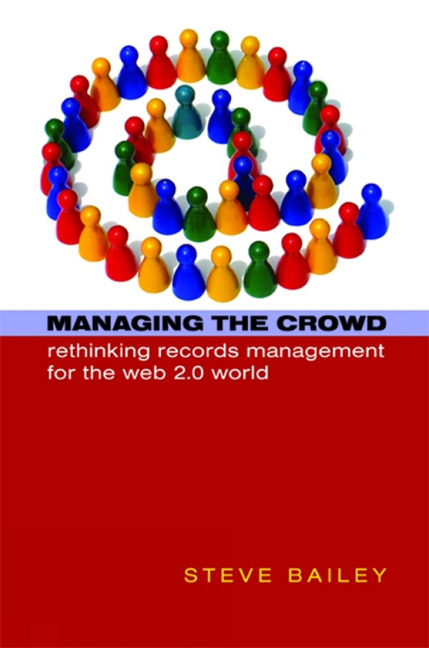Book contents
- Frontmatter
- Dedication
- Contents
- Foreword
- Preface
- Part 1 The Nature Of The Changing World
- Part 2 Is records management no longer fit for purpose?
- 5 The need for critical professional self-examination
- 6 ‘Not all information sources are records’
- 7 The centralized command and control ethos
- 8 ‘Regardless of format...’
- 9 Appraisal, retention and destruction
- 10 The problems with applying existing approaches to appraisal in the Web 2.0 world
- Part 3 Records Management.0 And The Future Of Records Management 121
- Index
8 - ‘Regardless of format...’
from Part 2 - Is records management no longer fit for purpose?
Published online by Cambridge University Press: 08 June 2018
- Frontmatter
- Dedication
- Contents
- Foreword
- Preface
- Part 1 The Nature Of The Changing World
- Part 2 Is records management no longer fit for purpose?
- 5 The need for critical professional self-examination
- 6 ‘Not all information sources are records’
- 7 The centralized command and control ethos
- 8 ‘Regardless of format...’
- 9 Appraisal, retention and destruction
- 10 The problems with applying existing approaches to appraisal in the Web 2.0 world
- Part 3 Records Management.0 And The Future Of Records Management 121
- Index
Summary
Questions addressed in this chapter
• Was there ever any merit in attempting to manage records ‘regardless of their format’?
• Will Office 2.0 inevitably lead to format-specific information silos?
• What are the implications of the removal of a common storage facility within the Office 2.0 environment?
• Does the emergence of integrated Office 2.0 suites offer a potential new platform for management?
Did the concept of management ‘regardless of format’ ever really make sense?
It has long been an accepted truism of records management that we manage records according to their content and regardless of their format. It would have been nonsense to believe that the access or retention requirements of a record differed, simply because a version happened to be held on microfilm while another version covering the same content existed as a paper record. In this scenario, the format of the record is immaterial and from the management perspective it is the content that counts.
Certainly, when I was training to be a records manager a decade or so ago, the notion of management regardless of format was well and truly in vogue as a central plank of our approach to the management of electronic records. During the mid-1990s users were often likely to see the electronic version of their record as being somehow very different and even divorced entirely from its paper counterpart, which was clearly an unwelcome and unhelpful development. Our own professional perspective also risked being warped by the many and varied technical challenges posed by new electronic media, to the point where consideration of its content seemed almost an afterthought, with the focus very much on file formats, media instability and preservation of the bit stream. It must also be said that a concentration on content made life easier for members of the archive and records management professions. By retaining this sole focus on content, these professions were able to largely ignore the very real technical and scientific challenges posed by the need to manage the physical format of records, whether this be the specific storage requirements for magnetic media, the complexities of dealing with audio-visual content, or the science behind techniques for the mass de-acidification of late 19th century paper – all of which have been largely left to other professions to resolve.
- Type
- Chapter
- Information
- Managing the CrowdRethinking records management for the Web 2.0 world, pp. 81 - 88Publisher: FacetPrint publication year: 2008



